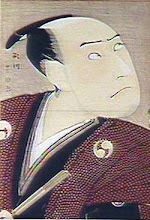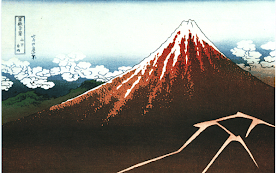In a past post I mentioned I had two Hallowe'en stories I wanted to tell. Since Hallowe'en is over, and Thanksgiving is quickly approaching, I think I should probably get around to the second story. As for Hallowe'en here, it came and went with nary a 'boo.' We have had our fifth straight year (as opposed to all those sexually deviant ones, I guess) without a Trick or Treater, which is a good thing since I haven't bothered to buy candy for the last three. And before I move on, what is the correct spelling for one who goes Trick or Treating? Does it end with '-or' like actor, creator, and facilitator; or does it end with '-er' like singer, engineer, and teacher? Microsoft's dictionary detests both (which is enough to make me want to use both), and I don't find the term in my American Heritage Dictionary of the English Language (4th ed) although it does list the past tense, or perhaps the passive voiced, 'trick or treated.'
Anyway, this particular story takes place on 6-West. The sixth floor was the top floor for the wings that held the wards, the seventh and eighth floors being the domain of the hospital school, recreation rooms and the much feared Contagious Diseases department. Little was known, at least by us bleeders, about the Contagious Diseases area except we were fairly sure that was where people with TB, meningitis, hepatitis and polio were sent. It was the one place in the whole hospital that truly frightened me. Probably because there were always several iron lungs scattered about the halls. Even empty, or perhaps especially empty, those were amazingly sinister, terrifying machines. That there are people who have spent upwards of fifty years in one of those canisters is almost beyond my understanding.
Be that as it may, the reason it is important to know that 6-West (later, through no fault of its own, renamed 10-West) was on the top floor is because of the windows. The hospital's windows, having been built somewhere around WWI, were wooden casement windows that actually opened, and there was quite a bit of play between the window and its sill. When the wind was right, which meant pretty much anything but a dead calm, the windows out on the sun porch would vibrate in their sills which would often cause them to sound like long, ghostly moans and groans. During the day there was so much noise and activity in the ward that you didn't notice them, but at night after lights out those moans coming from the sun porch were very loud.
Quite often, after lights out which was around 8:30 or 9:00, we would talk quietly for a while. We were, after all, mature almost adults of eleven or twelve—some of us had even started puberty—and didn't need as much sleep as we did when we were kids. We'd tell jokes, talk about our homes and schools, stuff that had happened that day, and tell stories. And just like camp the creepier the better. If there was a new kid on the ward he or she would almost always ask what that noise coming from the sun porch was.
We, being kind and understanding, knew just how scared the new kid would be in this huge, gloomy room; perhaps away from home for the first time in their life, and dealing with some kind of very serious illness or injury. It was enough to frighten anyone. So we would tell them that it was the ghost of a boy who had died on the sun porch one night many years ago. His name was Bobby, and he moaned like that because he was lonely, and if you went out on the sun porch at night he would get you to be his playmate.
I mentioned in another post that just outside the main doors to the ward, out by the nurses' station, was a restroom. Well,there was another restroom for patients at the other end of the ward, but to get to it you had to go onto the sun porch. The new kid would tell us we were lying, and there was no such things as ghosts, and they weren't afraid; but after lights out no one, not even the kids in the beds next to the sun porch ever used that restroom. They all made the long walk to the one out by the nurses' station.
Sometimes, after a particularly loud and drawn out moan, the kid would ask if Bobby ever came into the ward, and we would reassure him that no, so far he had never done that but he seemed to be getting more and more lonely so who knew what would happen?
One year, I think it was the year after the great pumpkin war, we were celebrating Devil's Night by telling ghost stories. The nurse had been in once and told us to keep things quiet—she didn't want us waking the younger kids up. The girl across from me had just finished a pretty creepy story, and the sun porch windows were moaning and groaning like crazy. All of us were checking the shadows pretty closely.
I started telling a story I had heard on a Boy Scout campout. I was doing a good job of making it eerie, the wind was howling outside, and Bobby was moaning perfectly. Just as I got to the climax of the story, the girl across from me screamed like a banshee on fire.
There were now approximately seventeen wet beds on the ward.
The girl was having some kind of seizure. The scream had been so loud it was like a physical blow, and by the time our ears stopped ringing and we started breathing again she had fallen out of her bed and was having convulsions on the floor. A third year med student and an intern came running into the ward, and by the time they got to her she had worked her way down to the foot of her bed.
One second she would be curled up in a tight ball, and the next second she would slam out so straight her back would be bowed. The student, showing more intelligence than I had ever seen in a student or most interns, knelt down by her head and tried to keep her from slamming it into the granite floor when she would straighten out.
The intern wasn't quite as bright.
During one of the moments she was curled up in a fetal position, he squatted down like a catcher. In front of her feet. About then a first year resident came onto the ward, but before he could say anything she straightened out. She slammed into the intern like a giant plunger in a pinball machine. Her feet hit him directly on target, and he doubled up and slid on his back the twenty-some feet until he hit the foot of my bed. Then he kind of fell over on his side with both of his hands holding what was left of his more private parts.
By that time the girl's seizure had ended and she was lying limply on the floor. The nurse and student were tending to her. The resident knelt down and checked her out, then came over to my bed. He made some comment about me being the cause of all this, and then said, "I bet you pee'd your bed."
I said, "Not really."
Then he looked down at the intern and said, "You gonna live?"
The intern was still lying doubled up on his side, clutching his groin, and the only sound he made was a kind of tight, high squeak. I knew that sound. I had made it that summer when my feet had slipped off the pedals and I had hit the crossbar of my bike. It had taken me what seemed like an hour and a half to be able to breathe again. I think it took the intern a bit longer.
They got the girl back in her bed, changed a couple of the wetter beds, and made vague but very dire threats about what would happen if we didn't go to sleep. The next morning as they made rounds the resident caused the third year resident a moment's confusion when he asked me if my sheets had dried yet; and the intern was walking with a strange kind of bow legged waddle and cringed violently if anything went toward his waist.
I asked the intern if he thought my story might have caused the girl's seizure—I had spent most of the night worrying about it—and he assured me I had nothing to do with it. It would have happened no matter what we were doing. The girl had a pretty bad headache that day, but didn't remember anything about the seizure, and went home about a week later. I never did know why she was in the hospital.
07 November 2009
Subscribe to:
Post Comments (Atom)










No comments:
Post a Comment